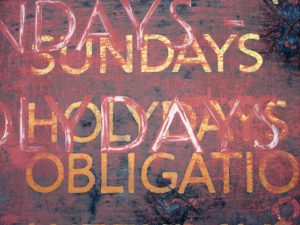
::This post was first featured on October 31, 2011::
A recent discussion in our group uncovered that one member’s church had advertised All Saint’s Day not as a Holy Day of Obligation, but rather some vague description called a “holy day of opportunity.” I just had to take the opportunity to 1) clarify what the Church teaches on Holy Days of Obligations and 2) if your church has done something similar, I want you to understand that this is not correct and you are entitled to the Truth of what our Faith teaches instead of vague descriptions that cause confusion and even mortal sins if you do not attend Mass due to the ambiguity.
The Church calls our basic obligations to the Faith, meaning the absolute bare minimum one can do to participate in their Faith, precepts. They can be found in the Catechism #2041-2043 and they outline five points. They are:
- You shall attend Mass on Sundays and on holy days of obligation and rest from servile labor. We must “sanctify the day commemorating the Resurrection of the Lord” (Sunday), as well as the principal feast days, known as Catholic holy days of obligation. This requires attending Mass, “and by resting from those works and activities which could impede such a sanctification of these days.”
- You shall confess your sins at least once a year. We must prepare for the Eucharist by means of the Sacrament of Reconciliation (Confession). This sacrament “continues Baptism’s work of conversion and forgiveness.”
- You shall receive the sacrament of the Eucharist at least during the Easter season. This “guarantees as a minimum the reception of the Lord’s Body and Blood in connection with the Paschal feasts, the origin and center of the Christian liturgy.”
- You shall observe the days of fasting and abstinence established by the Church. “The fourth precept ensures the times of ascesis and penance which prepare us for the liturgical feasts and help us acquire mastery over our instincts and freedom of heart.” See below for more about fasting & abstinence.
- You shall help to provide for the needs of the Church. “The fifth precept means that the faithful are obliged to assist with the material needs of the Church, each according to his own ability.”
24* Do you not know that the runners in the stadium all run in the race, but only one wins the prize? Run so as to win.p25Every athlete exercises discipline in every way. They do it to win a perishable crown, but we an imperishable one.q26Thus I do not run aimlessly; I do not fight as if I were shadowboxing.27No, I drive my body and train it, for fear that, after having preached to others, I myself should be disqualified.
